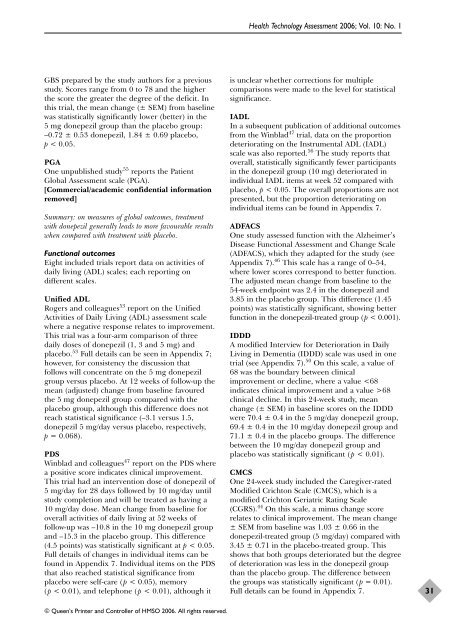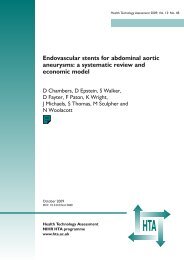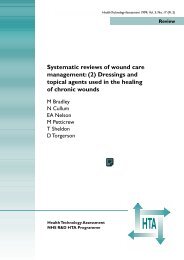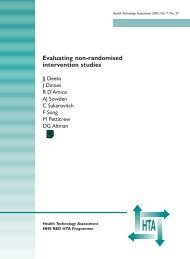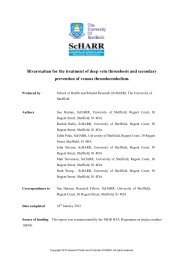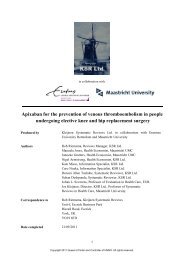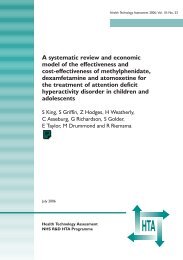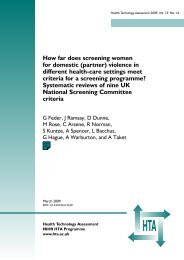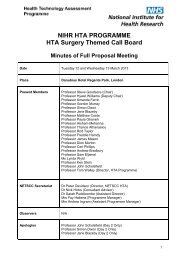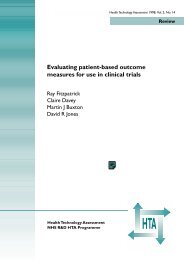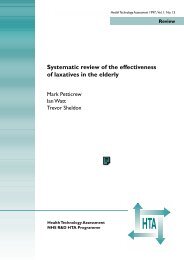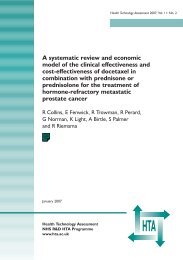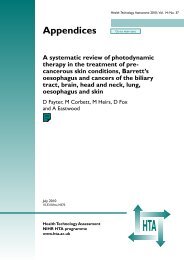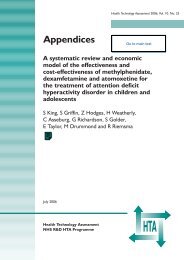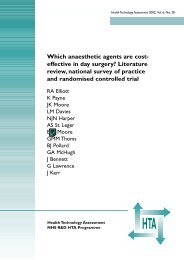Donepezil, rivastigmine, galantamine and memantine for ...
Donepezil, rivastigmine, galantamine and memantine for ...
Donepezil, rivastigmine, galantamine and memantine for ...
You also want an ePaper? Increase the reach of your titles
YUMPU automatically turns print PDFs into web optimized ePapers that Google loves.
GBS prepared by the study authors <strong>for</strong> a previous<br />
study. Scores range from 0 to 78 <strong>and</strong> the higher<br />
the score the greater the degree of the deficit. In<br />
this trial, the mean change (± SEM) from baseline<br />
was statistically significantly lower (better) in the<br />
5 mg donepezil group than the placebo group:<br />
–0.72 ± 0.53 donepezil, 1.84 ± 0.69 placebo,<br />
p < 0.05.<br />
PGA<br />
One unpublished study 55 reports the Patient<br />
Global Assessment scale (PGA).<br />
[Commercial/academic confidential in<strong>for</strong>mation<br />
removed]<br />
Summary: on measures of global outcomes, treatment<br />
with donepezil generally leads to more favourable results<br />
when compared with treatment with placebo.<br />
Functional outcomes<br />
Eight included trials report data on activities of<br />
daily living (ADL) scales; each reporting on<br />
different scales.<br />
Unified ADL<br />
Rogers <strong>and</strong> colleagues 53 report on the Unified<br />
Activities of Daily Living (ADL) assessment scale<br />
where a negative response relates to improvement.<br />
This trial was a four-arm comparison of three<br />
daily doses of donepezil (1, 3 <strong>and</strong> 5 mg) <strong>and</strong><br />
placebo. 53 Full details can be seen in Appendix 7;<br />
however, <strong>for</strong> consistency the discussion that<br />
follows will concentrate on the 5 mg donepezil<br />
group versus placebo. At 12 weeks of follow-up the<br />
mean (adjusted) change from baseline favoured<br />
the 5 mg donepezil group compared with the<br />
placebo group, although this difference does not<br />
reach statistical significance (–3.1 versus 1.5,<br />
donepezil 5 mg/day versus placebo, respectively,<br />
p = 0.068).<br />
PDS<br />
Winblad <strong>and</strong> colleagues 47 report on the PDS where<br />
a positive score indicates clinical improvement.<br />
This trial had an intervention dose of donepezil of<br />
5 mg/day <strong>for</strong> 28 days followed by 10 mg/day until<br />
study completion <strong>and</strong> will be treated as having a<br />
10 mg/day dose. Mean change from baseline <strong>for</strong><br />
overall activities of daily living at 52 weeks of<br />
follow-up was –10.8 in the 10 mg donepezil group<br />
<strong>and</strong> –15.3 in the placebo group. This difference<br />
(4.5 points) was statistically significant at p < 0.05.<br />
Full details of changes in individual items can be<br />
found in Appendix 7. Individual items on the PDS<br />
that also reached statistical significance from<br />
placebo were self-care (p < 0.05), memory<br />
(p < 0.01), <strong>and</strong> telephone (p < 0.01), although it<br />
© Queen’s Printer <strong>and</strong> Controller of HMSO 2006. All rights reserved.<br />
Health Technology Assessment 2006; Vol. 10: No. 1<br />
is unclear whether corrections <strong>for</strong> multiple<br />
comparisons were made to the level <strong>for</strong> statistical<br />
significance.<br />
IADL<br />
In a subsequent publication of additional outcomes<br />
from the Winblad 47 trial, data on the proportion<br />
deteriorating on the Instrumental ADL (IADL)<br />
scale was also reported. 56 The study reports that<br />
overall, statistically significantly fewer participants<br />
in the donepezil group (10 mg) deteriorated in<br />
individual IADL items at week 52 compared with<br />
placebo, p < 0.05. The overall proportions are not<br />
presented, but the proportion deteriorating on<br />
individual items can be found in Appendix 7.<br />
ADFACS<br />
One study assessed function with the Alzheimer’s<br />
Disease Functional Assessment <strong>and</strong> Change Scale<br />
(ADFACS), which they adapted <strong>for</strong> the study (see<br />
Appendix 7). 46 This scale has a range of 0–54,<br />
where lower scores correspond to better function.<br />
The adjusted mean change from baseline to the<br />
54-week endpoint was 2.4 in the donepezil <strong>and</strong><br />
3.85 in the placebo group. This difference (1.45<br />
points) was statistically significant, showing better<br />
function in the donepezil-treated group (p < 0.001).<br />
IDDD<br />
A modified Interview <strong>for</strong> Deterioration in Daily<br />
Living in Dementia (IDDD) scale was used in one<br />
trial (see Appendix 7). 50 On this scale, a value of<br />
68 was the boundary between clinical<br />
improvement or decline, where a value 68<br />
clinical decline. In this 24-week study, mean<br />
change (± SEM) in baseline scores on the IDDD<br />
were 70.4 ± 0.4 in the 5 mg/day donepezil group,<br />
69.4 ± 0.4 in the 10 mg/day donepezil group <strong>and</strong><br />
71.1 ± 0.4 in the placebo groups. The difference<br />
between the 10 mg/day donepezil group <strong>and</strong><br />
placebo was statistically significant (p < 0.01).<br />
CMCS<br />
One 24-week study included the Caregiver-rated<br />
Modified Crichton Scale (CMCS), which is a<br />
modified Crichton Geriatric Rating Scale<br />
(CGRS). 44 On this scale, a minus change score<br />
relates to clinical improvement. The mean change<br />
± SEM from baseline was 1.03 ± 0.66 in the<br />
donepezil-treated group (5 mg/day) compared with<br />
3.45 ± 0.71 in the placebo-treated group. This<br />
shows that both groups deteriorated but the degree<br />
of deterioration was less in the donepezil group<br />
than the placebo group. The difference between<br />
the groups was statistically significant (p = 0.01).<br />
Full details can be found in Appendix 7.<br />
31


